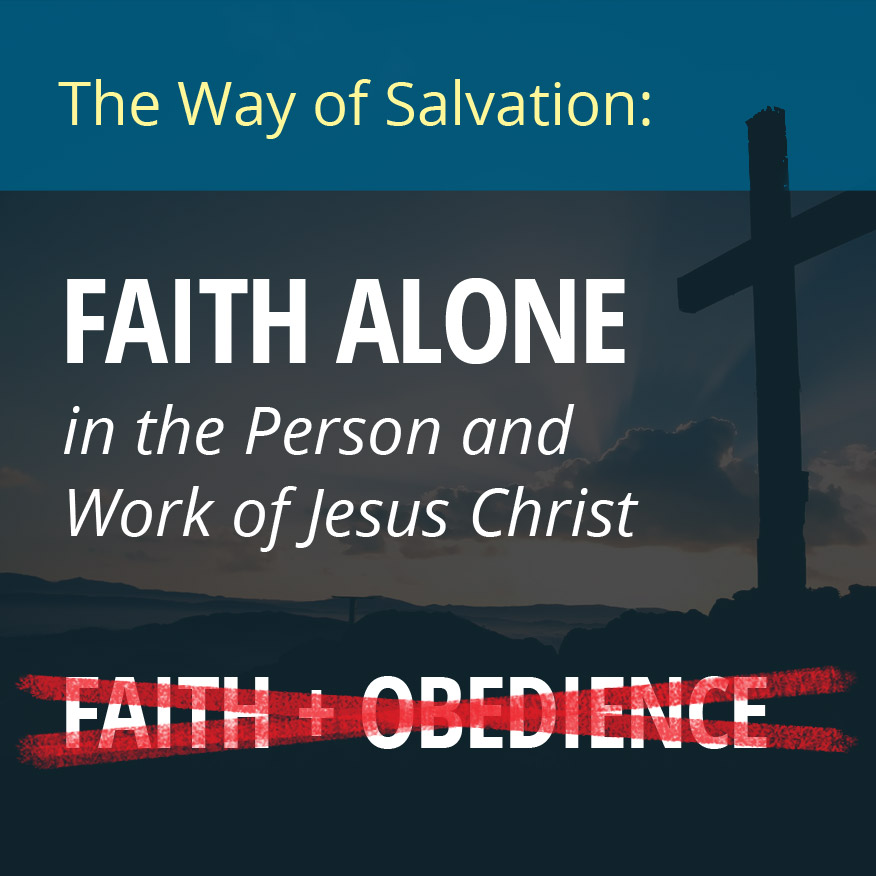
by Steve Halbrook
I have followed Brian Shilhavy’s “Vaccine Impact” (also mirrored as “Health Impact News“) for some time. It is a very good source of information about the evils of vaccines. Brian is an excellent researcher on this topic.
I am glad that last July, he championed the truth that God’s people today are saved through faith and not by obedience to the law:
Different from the Old Covenant, one now enters into the community of the people of God through faith, not by obeying the Law, because by obeying the Law everyone comes up short and is found guilty before God for not keeping the whole law.
Brian Shilhavy, “American Christians are Biblically Illiterate Not Understanding the Difference Between The Old Covenant vs. The New Covenant” (Vaccine Impact, July 2, 2024). Retrieved October 5, 2024, from https://vaccineimpact.com/2024/american-christians-are-biblically-illiterate-not-understanding-the-difference-between-the-old-covenant-vs-the-new-covenant
The problem is in his statement about the Old Covenant. If in the above statement he is saying that there was a different path to God in the Old Covenant (namely, obedience), he is wrong. Earlier in the article he also states,
Even under the Old Covenant, one did not become a part of God’s people just by ethnicity – one had to have faith and follow the Law. (Ibid.)
Agreed that truly being God’s people is not by ethnicity. But this is not the point of dispute. He is saying that under the Old Covenant not only faith was required for salvation, but obedience as well. Faith (in Christ) is indeed required for salvation, but once you attempt to combine it with works, you nullify it — whether in the Old or New Covenant.
For once works are added, one no longer trusts in what Christ has done for him to save him (or, in the Old Covenant, looking forward to what Christ will do for him to save him), but what Christ will do for someone if he is obedient enough. The object of faith becomes oneself instead of Christ because the ultimate determiner of salvation becomes oneself.
Scripture says this of works for salvation being opposed to God’s grace — note its application to those in both the Old and the New Testament:
God has not rejected his people whom he foreknew. Do you not know what the Scripture says of Elijah, how he appeals to God against Israel? “Lord, they have killed your prophets, they have demolished your altars, and I alone am left, and they seek my life.” But what is God’s reply to him? “I have kept for myself seven thousand men who have not bowed the knee to Baal.” So too at the present time there is a remnant, chosen by grace. But if it is by grace, it is no longer on the basis of works; otherwise grace would no longer be grace. (Romans 11:2-6, ESV)
On this Bible commentator Matthew Henry writes,
There was a chosen remnant of believing Jews, who had righteousness and life by faith in Jesus Christ. These were kept according to the election of grace. If then this election was of grace, it could not be of works, either performed or foreseen. (Concise Commentary on the Whole Bible by Matthew Henry, Romans 11:1-10)
And so Old Covenant believers were not saved by faith plus obedience to the law, and it is dangerous to suppose that one, in any era, can contribute to his salvation. Because then it means that man can at least partially save himself without Jesus Christ.
As Brian himself says, “by obeying the Law everyone comes up short and is found guilty before God for not keeping the whole law.” Faith alone has always been the way to Christ — whether looking forward to his saving work in the Old Covenant, or looking back to it in the New.
With this being the case, how can, as Brian states in the above quote, Old Covenant believers be saved by “faith plus obedience to the law”?
Perhaps he just needs to clarify what he means. Deep down he must understand that even the saved in the Old Covenant were so by faith alone, for, again, he says, “by obeying the Law everyone comes up short and is found guilty before God for not keeping the whole law.”
Adding to the confusion was an article he released the next month, titled, “The Way of Salvation has ALWAYS been by Faith and Obedience – Not by a ‘Chosen’ Nation or Religion.” I am not taking issue with his points that we are not saved by our ethnicity or our national identity. I pretty much agree when he says,
What I want to report in this article, is that there is one thing that did not change between the Old Testament and the New Testament, and that is the fact that salvation by God has always been by faith, and not through a “chosen people” or a “religion”, and that this has always been true.
Brian Shilhavy, “The Way of Salvation has ALWAYS been by Faith and Obedience – Not by a ‘Chosen’ Nation or Religion” (Vaccine Impact, August 18, 2024). Retrieved October 5, 2024, from https://vaccineimpact.com/2024/the-way-of-salvation-has-always-been-by-faith-and-obedience-not-by-a-chosen-nation-or-religion
(Although I prefer saying that salvation has always been through faith instead of by faith, as God’s people are saved by Christ through faith. But we might mean the same thing.)
However, when he later speaks of those under the Old Covenant, as he does in the other article, he not only says faith is needed for salvation, but obedience:
After Joshua and his generation died, the Book of Judges was written, and in the first couple of chapters of Judges, this principle of following The Way and living by faith in obedience to the Covenant they made with God, was the condition for salvation. (Ibid.)
And he seems to not be limiting obedience to a condition of salvation in the Old Covenant, for the article’s title reads, “The Way of Salvation has ALWAYS been by Faith and Obedience.” “Always” entails even those who are saved today in the New Covenant era.
This is odd since he clearly stated in the first article mentioned (only a month and a half prior to this newer article) that in the New Covenant, faith — but not works — was required for salvation. Has he changed his views? Is he now saying that even the saved today are saved eternally by, to some extent, obedience?
Some — and I hope this is not the case with Brian — will rightfully say that New Covenant believers are not saved by obeying the commands in the Old Testament, but then turn around and say that commands in the New Testament are a condition for salvation. (Interesting, though — how many commands in the New Testament are not originally in the Old Testament?) Some of those who do so might also, unfortunately, redefine faith to include obedience, so that they seem to uphold salvation through faith alone — until you press them on what they mean by faith.
Maybe this has been his view all along, and he has not been (to my knowledge) very explicit about it.
But first, let me entertain some other possibilities of what he might mean because it is important we give Brian the benefit of the doubt and not hastily declare him a heretic. And indeed, perhaps he means something different, even though I would still take issue with how the wording in his title can be perceived — in a way detrimental to his readers.
Perhaps what he means to say in the title is “The Way of Salvation has ALWAYS been by Faith [New Covenant] or Faith and Obedience [Old Covenant] – Not by a ‘Chosen’ Nation or Religion.” This would be consistent with his views in his July article (even though I would still take issue with him saying that those in the Old Covenant were saved by obedience — but at least he would have the New Covenant right).
Maybe, then, in the title Brian is not so much being strict about the wording of the first half of the title, but focusing more on what he is opposing (as reflected in the second half of the title: “Not by a ‘Chosen’ Nation or Religion”). Those of us who write a lot can easily overlook precision in our words. I am probably imprecise in this very article at some points.
Or, perhaps when Brian refers to salvation in the newer article, he is not referring to one’s eternal salvation (salvation through Jesus Christ that begins in this life and extends to the next), but to a temporal salvation (related to this life, such as deliverance from one’s enemies). I wouldn’t take an issue if it just related to temporal salvation, since God often protects His people from their enemies in this life. In some cases, this protection may come as a blessing for trusting and obeying Him.
Or, instead of referring to eternal salvation, could Brian be referring to sanctification — that is, to a degree a salvation from committing sin that God enables Christians to do in this life? Something that follows eternal salvation — not something that causes it.
In sanctification, as Louis Berkhof says, the Holy Spirit
delivers the justified sinner from the pollution of sin, renews his whole nature in the image of God, and enables him to perform good works. (Berkhof, Systematic Theology. p. 532)
Mind you, we are not talking about sinless perfectionism, as Christians in this life also still have a sin nature. And so the Westminster Confession of Faith reads,
This sanctification is throughout, in the whole man; yet imperfect in this life, there abiding still some remnants of corruption in every part; whence ariseth a continual and irreconcilable war, the flesh lusting against the Spirit, and the Spirit against the flesh. (WCF Chapter 13)
But from the standpoint of Berkhof’s definition, some might be meaning sanctification when they refer to salvation. And so maybe Brian has this in mind when he refers to salvation being by faith and obedience.
Again, I wouldn’t make a public issue with Brian saying that “The Way of Salvation has ALWAYS been by Faith and Obedience” if sanctification is what he means. (Although I still might word things differently even on the matter of sanctification, as I see faith being its root, and obedience being its fruit.)
However, eternal salvation seems at least to some extent to be in view in Brian’s article, since in making his case for “faith and obedience” being “the way of salvation”, he cites this passage:
Jesus said to him, “I am the way, and the truth, and the life. No one comes to the Father except through me.” (John 14:6, ESV)
And this is my problem with Brian’s article: it at least gives the impression that it denies the biblical doctrine of justification by faith alone for “faith PLUS obedience.”
Scripture, however, very clearly opposes the idea that obedience contributes to salvation — in any era. For instance, in Galatians, we find this addressed to Christians in the New Covenant era — but it also harkens back to Abraham:
O foolish Galatians! Who has bewitched you? It was before your eyes that Jesus Christ was publicly portrayed as crucified. Let me ask you only this: Did you receive the Spirit by works of the law or by hearing with faith? Are you so foolish? Having begun by the Spirit, are you now being perfected by the flesh? Did you suffer so many things in vain—if indeed it was in vain? Does he who supplies the Spirit to you and works miracles among you do so by works of the law, or by hearing with faith— just as Abraham “believed God, and it was counted to him as righteousness”? (Galatians 3:1-6, ESV)
Note that Paul pits the true Gospel against any so-called gospel that adds or takes away from “hearing with faith”: “Did you receive the Spirit by works of the law or by hearing with faith?” Obedience to the Mosaic law for salvation is explicitly opposed here (“by works of the law”), but by making “hearing with faith” the criterion for the true Gospel, by implication, anything that veers from this for salvation is opposed (whether obedience to any other standard, a ritual, or whatever).
That is, belief (“just as Abraham ‘believed God’”) in the finished work of Christ alone (“before your eyes that Jesus Christ was publicly portrayed as crucified”) on one’s behalf is sufficient for salvation. More specifically, one is saved by Christ, with faith being the alone instrument of justification.
No works/obedience. No religious rites. No anything else. Only Christ — through faith. Anything else is a different gospel.
And this how it always was. Fallen man needs a savior because he cannot save himself. Salvation requires absolute moral perfection — and only Christ provides this. He was morally perfect on behalf of His people.
The saved from the Old Testament looked forward to the coming of Christ, while the saved in the New Covenant era look back to His finished work. As Galatians continues,
Know then that it is those of faith who are the sons of Abraham. And the Scripture, foreseeing that God would justify the Gentiles by faith, preached the gospel beforehand to Abraham, saying, “In you shall all the nations be blessed.” So then, those who are of faith are blessed along with Abraham, the man of faith. (Galatians 3:7-9, ESV)
And so Jesus says in John 8:56,
Your father Abraham rejoiced that he would see my day. He saw it and was glad. (John 8:56, ESV)
And there was no parenthesis for Moses and Israel regarding faith alone for justification. For as we have read, “And the Scripture, foreseeing that God would justify the Gentiles by faith, preached the gospel beforehand to Abraham, saying, ‘In you shall all the nations be blessed.'” All nations entails Israel, and so saved Israelites in the Old Testament under the time of the Mosaic Law were also saved through faith alone.
Regarding Moses himself, Scripture says that he knew about Christ:
By faith Moses, when he was grown up, refused to be called the son of Pharaoh’s daughter, choosing rather to be mistreated with the people of God than to enjoy the fleeting pleasures of sin. He considered the reproach of Christ greater wealth than the treasures of Egypt, for he was looking to the reward. (Hebrews 11-25-26, ESV)
What about the great king of Israel, David? Like Galatians 3, Romans 4 discusses salvation by faith apart from works. Again, the faith of Abraham is given as an example, but David is also mentioned. This is because, as the context makes clear, salvation has always been by faith alone — not by faith plus obedience:
What then shall we say was gained by Abraham, our forefather according to the flesh? For if Abraham was justified by works, he has something to boast about, but not before God. For what does the Scripture say? “Abraham believed God, and it was counted to him as righteousness.” Now to the one who works, his wages are not counted as a gift but as his due. And to the one who does not work but believes in him who justifies the ungodly, his faith is counted as righteousness, just as David also speaks of the blessing of the one to whom God counts righteousness apart from works:
“Blessed are those whose lawless deeds are forgiven,
and whose sins are covered;
blessed is the man against whom the Lord will not count his sin.”Is this blessing then only for the circumcised, or also for the uncircumcised? For we say that faith was counted to Abraham as righteousness. How then was it counted to him? Was it before or after he had been circumcised? It was not after, but before he was circumcised. (Romans 4:1-10, ESV)
Those who hold to salvation by faith+works often cite the book of James, where it says:
You see that a person is justified by works and not by faith alone. (James 2:24)
Without taking a lot of time for a deep dive into this verse, whatever this passage means (and there are differing views) it should be easily seen that this is not about justification in terms of eternal salvation for two reasons: A) this would contradict all the passages that teach salvation through faith alone. For example: Galatians 3, as we discussed above, as well as Romans 3:
For by works of the law no human being will be justified in his sight, since through the law comes knowledge of sin. But now the righteousness of God has been manifested apart from the law, although the Law and the Prophets bear witness to it—the righteousness of God through faith in Jesus Christ for all who believe. (Romans 3:20-22a, ESV)
B) The word justify is not self-defining — its meaning is determined by context. I doubt those who insist that this means eternal salvation in James 2 (forcing a single meaning on the word) also hold that wisdom obtains eternal salvation “by all her children” in Luke 7:35, which reads “Yet wisdom is justified by all her children.” (Luke 7:35, ESV)
More about salvation always being by Christ through faith alone here.
Since Christ obeyed God perfectly and provides through His sacrifice perfect forgiveness of sins (those committed in the past, the present, and the future), His people (who are saved/eternally secure instantly through faith) cannot contribute to their salvation by works. How can you add to a perfect, 100% salvation obtained by Christ?
You cannot, by your own obedience, improve upon Christ’s perfect obedience imputed to you, and you cannot, by your own obedience, contribute to Christ’s perfect atonement for sins on your behalf.
And so what about works for the Christian? They are indeed important — extremely important! However, they are not done to be saved, but because one is saved; not to earn God’s love, but out of love, because of God’s love; not to be a Christian, but because one is a Christian.
For by grace you have been saved through faith. And this is not your own doing; it is the gift of God, not a result of works, so that no one may boast. For we are his workmanship, created in Christ Jesus for good works, which God prepared beforehand, that we should walk in them. (Ephesians 2:8-10, ESV)
Note that this passage denies the role of works in salvation, and yet it mentions going on to good works after salvation. One needs to first possess Jesus — and thus salvation — for true good works from the heart (one is “created in Christ Jesus for good works”).
We must also note that while those who are saved cannot lose their salvation, they can still undergo consequences in this life for disobedience (e.g., 1 Corinthians 11:30). And indeed, those who are saved can expect discipline in whatever forms God chooses in this life:
My son, do not despise the Lord’s discipline
or be weary of his reproof,
for the Lord reproves him whom he loves,
as a father the son in whom he delights. (Proverbs 3:11-12)
As noted earlier, Christians do not obey perfectly as they still have a sin nature until death. And so while Christians have a degree of obedience, they also have a degree of sin in this life.
But as for those who change the Gospel by adding obedience for salvation, it is an understatement that they are playing with fire. Note the warning in Galatians 1:
I am astonished that you are so quickly deserting him who called you in the grace of Christ and are turning to a different gospel— not that there is another one, but there are some who trouble you and want to distort the gospel of Christ. But even if we or an angel from heaven should preach to you a gospel contrary to the one we preached to you, let him be accursed. As we have said before, so now I say again: If anyone is preaching to you a gospel contrary to the one you received, let him be accursed. (Galatians 1:6-9)
For more on the Gospel, see Charlie Bing’s The Content on the Gospel of Salvation
I circle back to Brian’s article. Maybe there is something that I am missing, and/or he just needs clarification. I sent two questions in the comment submission form in his article, but there was no response. Perhaps for opposing vaccines and such, the technocratic elites have him on their list and blocked my comments from reaching him. This is very possible, per what Brian writes here about the challenges he has with emails reaching him.
Regardless of whatever Brian means about the Gospel (God knows), the doctrine of justification by faith alone must be defended on all fronts. In the vaccine awareness community, there are those who hold to the true Gospel, but there are also those who claim to be Christians but who hold to a false gospel, such as salvation by “faith plus works.” There are also evolutionists, atheists and pagans, as well as New-Agers who may seem to believe in Jesus, but in reality deny Him by seeing him as just one of many paths to God.
In short, those of us in the vaccine awareness community must realize that knowing the truth about vaccines — as important as that is — does not eternally save us. You might live a very healthy, vaccine-free life but then go to Hell when you die (a fate much worse than vaccine injury). For eternal salvation, we must know and believe the true Gospel of Jesus Christ.



Hello Steve Halbrook,
Has Brian responded to your article?
I also followed Brian Shilhavy’s site. He is outspoken against vaccination and call out those who are responsible. I have several disagreements regarding his Christian writings.
As for Faith + Obedience requirement for salvation, he is not alone saying that.
There are countless ministers and pastors be it Catholic/Eastern Orthodox/Protestant/Evangelical/Independant/Pentecostal/Charismatic and other denominations teaches that. These folks have no clear conviction and biblical way to salvation.
Dennis,
Haven’t heard anything from Brian thus far.
Yes indeed, false gospels are everywhere. Of course many Protestant churches are solid on the Gospel, some are definitely teaching works salvation. Then you have the “Restoration” Campbellite churches, which tend to be the worst … may God open the eyes of the nation! So much deception everywhere …